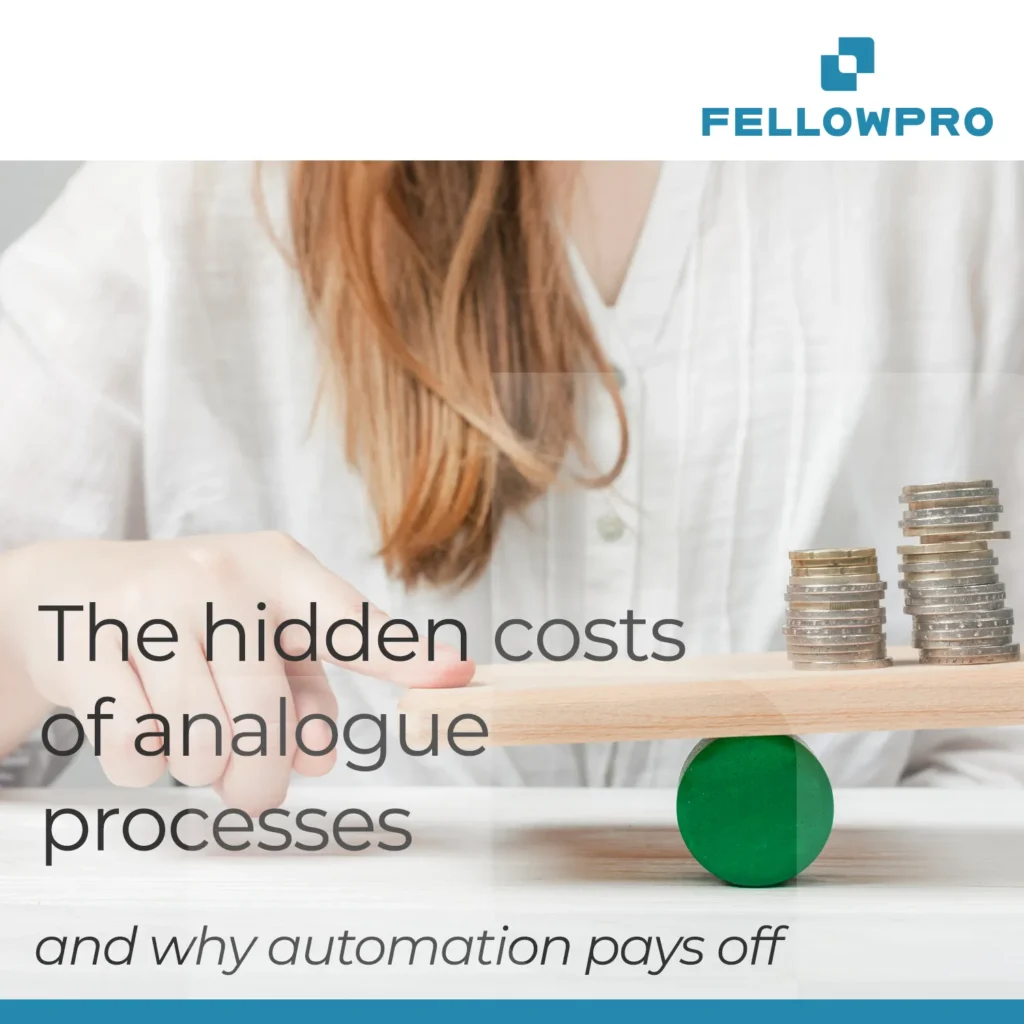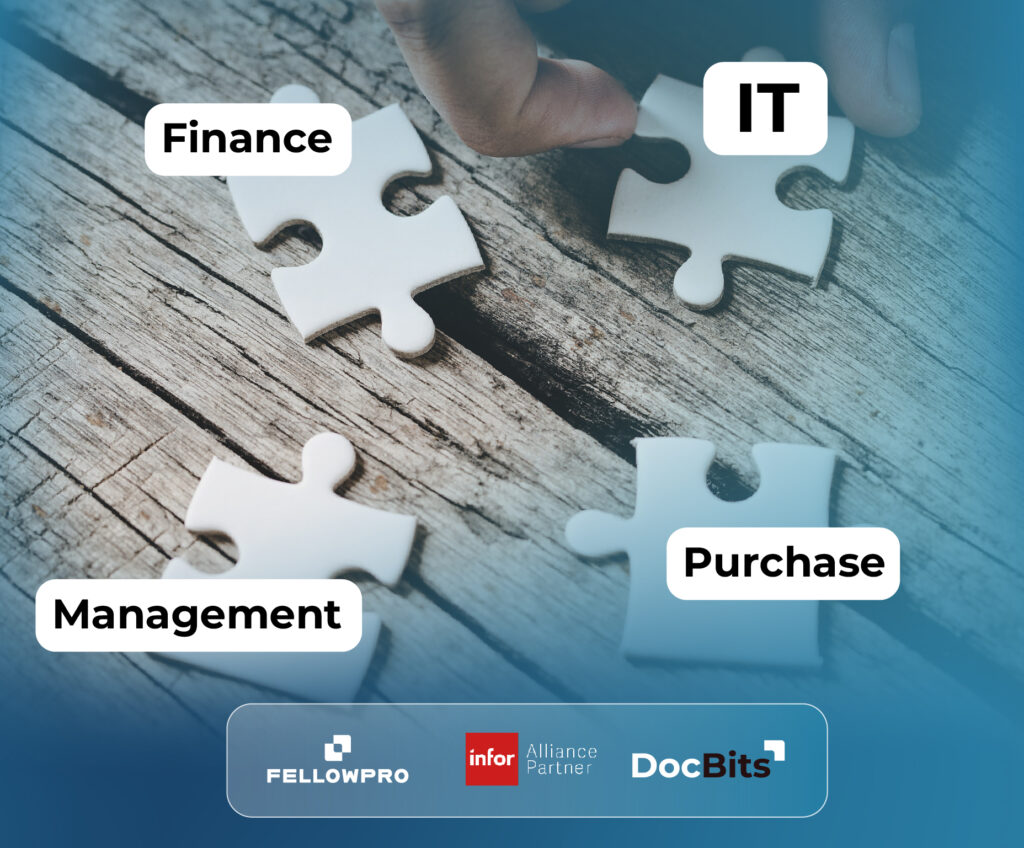
We are excited to announce a promising new partnership between FELLOWPRO and partners 2 innovate!
Imagine if your company could handle all recurring and time-consuming tasks automatically – from invoice verification and data extraction to processing customer inquiries. You would no longer have to spend hours waiting for your employees to manually enter data or check documents. Instead, you could focus on more important strategic tasks. That’s the promise of hyperautomation.
But what exactly does hyperautomation mean? Basically, it’s about using technologies such as Robotic Process Automation (RPA), Intelligent Document Processing (IDP), Artificial Intelligence (AI) and Machine Learning (ML) to automate workflows – not just in individual areas, but across the entire company.
Hyperautomation is a comprehensive approach in which different technologies work together to automate business processes. It’s not just about completing simple, repetitive tasks, but also about integrating complex and creative processes that previously only humans could do. A simple example: Imagine a company processes hundreds of invoices every day. Without hyperautomation, employees would have to manually check each invoice and enter it into the system. With hyperautomation, however, these tasks can not only be completed faster, but also more intelligently, as AI checks the invoices for errors and automatically enters them into the system.
Robotic Process Automation (RPA) is one of the main technologies driving hyperautomation. RPA makes it possible to use software robots that act like humans on user interfaces and perform repetitive tasks. Imagine having to constantly enter the same data into different systems – a tedious and error-prone task. With RPA, these entries could be done automatically and error-free, freeing up your employees to focus on value-adding activities.
A practical example: a company that regularly processes orders from customers could use RPA to automatically capture the order data and transfer it to the ERP system. This not only saves time, but also ensures that no data is overlooked or entered incorrectly.
Document processing is another area where hyperautomation can make a particularly big difference. Intelligent Document Processing (IDP) helps to extract unstructured data from documents and convert it into usable formats. This enables companies to automatically extract and process information from invoices, contracts or applications.
A concrete example: Suppose your company receives dozens of supplier invoices every day, which arrive in different formats and with different layouts. With our IDP solution DocBits, these invoices can be scanned automatically, the relevant data such as invoice number, amount, due date, etc. extracted and transferred directly into the system – all without manual intervention. DocBits not only ensures faster processing, but also greater accuracy and a significant reduction in errors that often occur during manual data entry.
Artificial intelligence (AI) and machine learning (ML) also play a key role in hyperautomation, as they make it possible to analyze data and make decisions on this basis. AI helps to recognize patterns and make predictions, which is particularly important in complex processes.
A practical example: AI could be used in a customer service center to categorize incoming inquiries and automatically provide the appropriate answers. Machine learning ensures that the system continuously learns and improves the quality of the answers. This would enable companies to make their customer service much more efficient without having to rely on human support.
In addition to RPA, IDP and AI, there are other technologies that are driving hyperautomation forward. Low-code/no-code platforms allow non-technical people to create automation, making it much easier to get started with hyperautomation. Cloud technologies offer the flexibility and scalability that companies need to adapt and expand their automation processes in real time.
The biggest benefit of hyperautomation is the huge increase in efficiency that companies can experience. By automating tasks that previously took a lot of time and resources, companies can reduce their operating costs while minimizing errors. But the benefits go far beyond just saving time – companies can also scale their business processes and focus on more strategic, value-adding tasks.
Hyperautomation is not just another buzzword, but a major development that is helping companies to take their processes to a new level of efficiency and intelligence. By combining RPA, IDP, AI and other advanced technologies, companies can revolutionize their workflows and reap the benefits of near-total automation. If your company wants to benefit from these advantages, moving towards hyperautomation could be the key to future success.
Image credits: Header- & featured image by wirestock on Freepik
Teilen:

We are excited to announce a promising new partnership between FELLOWPRO and partners 2 innovate!

What happens if you continue to process manually? – and why automation pays off. In many companies, central processes such as the processing of invoices,

Why efficiency makes all the difference – especially in document processing Time is money. A phrase that many have heard many times – but in

– and the Key to Business Success “Knowledge is power” – a quote that is more relevant to businesses today than ever before. In times

– why either or? What good is a brilliant idea if it never becomes reality?In the business world, it is no longer enough to rely

The security of sensitive data is more important than ever for companies today. Customers expect their information to be protected and processed to the highest

The security of sensitive data is more important than ever for companies today. Customers expect their information to be protected and processed to the highest

Unternehmen, die Finanzprozesse für ihre Kunden abwickeln, stehen vor der Herausforderung, Vertrauen und Sicherheit zu gewährleisten. Besonders wenn es um sensible Daten geht, sind starke